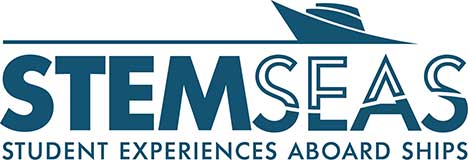HBCU Partnership Expedition
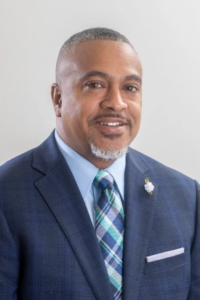
Dr. Reginald Archer, an Associate Professor of Applied GIS in the Department of Agricultural and Environmental Sciences at Tennessee State University (TSU), seeks to put TSU on everyone’s map with his research and teachings in Geographic Information Systems/Science (GIS) & Remote Sensing. He applies GIS to analyze spatial data and uses the “science of where” to conduct research, specifically environmental change related to sustainability, public health, hazards, vulnerability, disaster recovery and environmental justice. He teaches multiple courses related to geospatial applications for undergraduates and graduates. He directs the Geospatial Research and Analysis Lab (GRaAL) and the GIS certificate program at TSU. Dr. Archer has been the principal or co-principal investigator for at least 13 externally funded projects. In the last two years, his projects include funding from NASA, NSF, USDA, and the American Association of Geographers. He serves as a co-Leader/steering committee member of the Nashville Environmental Justice Initiative and serves in the Regional Environmental Roundtable of the Greater Nashville Regional Council. On campus, Dr. Archer actively participates in activities to broaden STEM participation, is a Lifetime Member of the National Society of Black Engineers (NSBE) and a TSU NSBE Chapter advisor, as well as an advisor for Minorities in Agriculture, Natural Resources and Related Sciences (MANNRS) chapter. He is also 1st Vice President (2022-23) of the National Association of Geoscience Teachers (NAGT) and a founding member of the HBCU Geosciences working group. Dr. Archer is dedicated to increasing the number of underrepresented students in STEM and regularly participates as a mentor in programs such as Tennessee Achieves, and STEM-related summer camps. Dr. Archer earned his Ph.D. in Geography from the University of California, Santa Barbara. He earned his M.S. in Civil Engineering and his B.S. in Surveying and Mapping from the University of Florida.
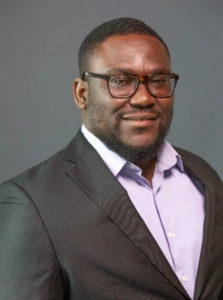
Emmanuel Atta-Obeng is an Assistant Professor of Biology in the Department of Natural Sciences at the Coppin State University. His research focuses on developing bio-products from biological resources as well as bio refinery wastes such as lignin and hemicellulose, employing green engineering while maximizing a circular economy. He is also interested in remediation of environmental contaminants using chemical approaches. Emmanuel holds a PhD. in Sustainable Biomaterials from the West Virginia University; a Master of Science Degree in Forest Sciences and Biology from Auburn University, Alabama and a Bachelor of Science in Natural Resources Management from KNUST, Ghana. Emmanuel enjoys teaching and mentoring undergraduate research. Outside the lab, he enjoys gardening, watching sports and trying new foods.
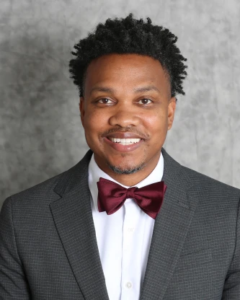
Dr. H. Justin Ballenger is an assistant professor of STEM education in the Division of Professional and Continuing Studies at Morehouse College. He also serves as the Deputy Director of the Atlanta University Center (AUC) Data Science Initiative. He has extensive experience with the implementation of programming that supports the academic development of youth from under-served populations. Dr. Ballenger is a National Science Foundation Quantitative Computational and Mixed-Methods Fellow and Faculty Fellow with the United Negro College Fund (UNCF). Within the Division of Continuing & Professional Studies, Dr. Ballenger serves on the curriculum development committee and the director of assessment for the Education Department. He also serves as affiliated faculty within the Morehouse Center for Educational Excellence (MCEE). Dr. Ballenger’s research agenda is focused on the academic achievement of under-served populations and pathways for students from under-served backgrounds to pursue STEM careers both in the United States and abroad. He also engaged with the research related to data science in K-12. As a component of this research, he also investigates teaching practices and teacher preparation programs for STEM educators.
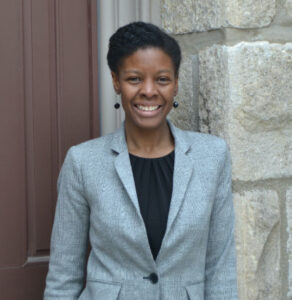
Dr. Shondricka Burrell is an assistant professor in science education in the Department of AdvancedStudies, Leadership & Policy in the School of Education and Urban Studies, at Morgan State University. Dr. Burrell is a socio-cognitive researcher applying both quantitative and qualitative analytical methods to the study of science teaching and learning. With advanced degrees in the geosciences and curriculum and instruction, Dr. Burrell’s research agenda includes: transformative learning experiences, science interest development, self-efficacy, Earth science and geoscience education, environmental justice, and science for social justice. Her research, Understanding the relationship between teacher use of epistemic operations and complexity of students’ explanations (2017) was awarded the Richard C. Anderson Graduate Student Research Award by the National Consortium for Instruction and Cognition. Dr. Burrell’s dissertation work, Towards a geoscience pedagogy: a socio-cognitive model (2019), was awarded the Dr. Rita Wolotkiewicz Phi Delta Kappa Award by Temple University’s College of Education in recognition of outstanding professional achievement. Dr. Burrell is committed to designing and developing equitable science learning experiences.
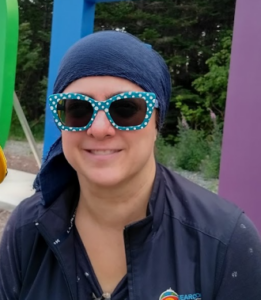
Sharon Katz Cooper is based at Columbia University and is one of the lead PIs for the current STEMSEAS program. She also oversees Education and Outreach programs for the U.S. office of the International Ocean Discovery Program. She first learned about IODP when working for the Smithsonian on developing the Sant Ocean Hall, during which she sailed on the very first School of Rock in 2005 and became permanently hooked. Now a full-fledged accidental geologist, she creates and implements programs around the world to encourage students, teachers and the general public to fall in love with STEM and get their minds blown by amazing Earth science going on every day. She is passionate about increasing diversity in the geosciences and providing entryway opportunities for students from all walks of life. In other parts of her life, she is a children’s book author, wife, mom, cook and laundry-folder. She is married and has three boys who refer to the JOIDES Resolution as “mommy’s ship.”
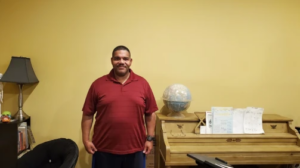
Dr. Dwight Ebanks, is an Assistant Professor in the Department of Marine and Environmental Sciences at Savannah State University, in Savannah, GA. He earned a Ph.D. in Marine Biology and Fisheries from the University of Miami and has a BS in Marine Biology and MS in Marine Sciences both from Savannah State University. Included among the courses he has taught are Marine Biology, Ichthyology, and Coastal Oceanography. His research interests include understanding the physiological responses in marine fishes to Ocean Acidification, trophic dynamics of estuarine fishes, elasmobranch (shark, rays, skates and sawfishes) electroreception and marine science education.
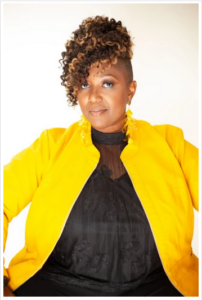
Loretta Williams Gurnell is affectionately known as SUPERLady to her SHINE Community, Ms. Loretta to SUPERGirls and dudes alike and master connector and influencer to colleagues, mentors and mentees within the STEM, education, political and private sectors. Originally from Trotwood, OH, home of the Lady Rams where Loretta lettered as a varsity player, from her 9th grade year as a standout on her basketball team, holds a Bachelor of Science degree in biological sciences and a master’s degree in education leadership from Central State University where she earned a scholarship to continue playing basketball. As a community youth and campus leader, Loretta was afforded many opportunities to sit on taskforce teams with political, educational and community leaders listening, learning, and sharing on ways to combat issues on race, gender, socioeconomics, and family rearing. Because of her academic, leadership skills and passion for community, Loretta was awarded an opportunity of a lifetime to travel to the Czech of Republic, playing basketball and sharing as a youth ministry leader. Loretta’s love of science, research, and medical statistics, positioned Loretta as a Tri-Beta Honor Society scholar and was awarded the only Research Scholarship of her class to Cornell University, studying the impact and effects of Purple Loosestrife had on wetlands, the environment, and the air we breathe. After 12 years in education with 2 ½ years of homeschooling her own sons, Loretta, along with her husband, decided on yet another pivot to her career. She would leave middle school STEM education and form a platform that would bring girls to STEM, STEM leaders, STEM opportunities and STEM resources. Still building women through empowerment and business opportunities, Loretta is the founder and visionary behind SUPERLady NetWORK, a community of thinkers, leaders and doers committed to IMPACT and change, benefitting SUPERGirls SHINE Foundation. With the NetWORK, local leadHERs are honored annually for how they lead, serve, and serve others well which is celebrated through their annual SUPERLady Soirée. Through SUPERGirls SHINE Foundation, Loretta’s vision to strengthen the pipeline for more women and girls from underserved communities in STEM + opportunities through mentorships, internships, scholarships, and business ownership, is alive and well. To date, more than 1635 girls, 19 school districts, 12 University/College Partners, 17 Schools, along with 91 executive leadHERs have brought the vision full circle in less than 5 ½ years. As a team of expert board leaders, advisory board and SHINE Community partners and volunteers, Loretta sees the next 5 years a catalyst to providing, instilling, and sustaining the essence of SUPERGirls SHINE Foundation as the preferred partner when identifying, building, developing and training marketable talent to not only fill STEM workforce positions but create and lead in C-suite roles that infiltrate our economy, creating access and equity for generations to come.
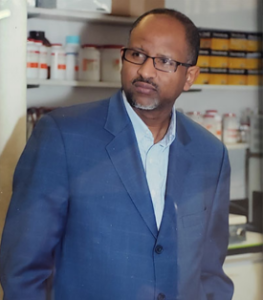
Dr. Mintesinot Jiru holds a PhD in Applied Biological Sciences from Gent University and is a Professor and Chair of the Department of Natural Sciences at Coppin State University. He has over 20 years of teaching and research experience in areas of climate change and resilience, bio-chemical water contamination, Food-Energy-Water nexus and socio-environmental synthesis stems. Dr. Jiru has done extensive work on land degradation, food security, and water management issues in Africa and Asia and currently he is actively pursuing a research program on understanding the effects of pharmaceuticals (mainly estrogen) on drinking water quality and aquatic life in Baltimore’s watersheds. Over the last ten years, Dr. Jiru has been closely working with the national synthesis center (SESYNC) to create new approaches to fostering research collaborations between social and natural scientists on problems at the interface of people and the environment. He currently serves as a member of the External Advisory Board for the National Socio-environmental Synthesis Center. Mintesinot is also a co-lead for a multi-institution project focusing on infusing climate change modules in courses to improve the science content in educational programs at various HBCU institutions. Dr. Jiru currently serves a program director for an NIH funded partnership between Johns Hopkins University, Morgan State University and Coppin State University to prepare post-docs for faculty positions in Bio-medical engineering in US higher learning institutions. He also serves as the chief editor for the American Journal of Experimental Agriculture. Mintesinot served on various panels and task forces including Maryland governor’s task force charged to author a white paper to develop graduate programs in alternative energy in Historically Black Colleges and Universities.
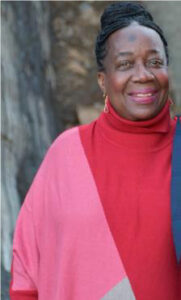
Dawn Lewis is an Instructor in the Biology Department, College of Science and Technology, Florida A&M University. I completed my BSc. (Hons) in Medicinal and Pharmaceutical Chemistry at Loughborough University, UK, my MSc. in Natural Products Chemistry at University of Guyana/University of Toronto (a joint University of Guyana and Toronto University program) and Ph.D. in Environmental Science at Florida A&M University. The title of my dissertation is “Biogeochemical and microbial assessment of un-mined and rehabilitated bauxite soils of Jamaica”.
My academic path has straddled several continents and a wide range of disciplines, including pharmacy, biotechnology, environmental science/microbial ecology, organismal biology and laser physics. My research interests include isolation and characterization of phytochemicals, utilization of biogeochemical and genomic analyses for monitoring the restoration success of rehabilitated soils, bioremediation of heavy metals in soils by exploiting the native soil microbiota, and the use of laser-induced breakdown spectroscopy (LIBS) for the analysis of environmental and biological samples. During my post-doctoral attachment at the Center for Plasma Science and Technology (CEPAST), I was responsible for initiating the use of LIBS for the analysis of environmental and biological samples. This research resulted in much cited publications.
My teaching experience varies from teaching at the elementary through university levels in challenging locations and to diverse groups. These experiences included teaching ceramics to students at the elementary level and transfer of sustainable technologies to rural women’s groups.
I am an avid gardener and crafter. At the moment I am focused on developing my hydroponic garden.
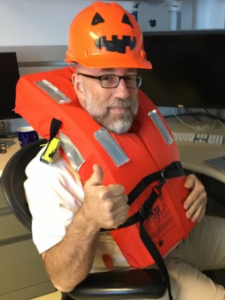
Jon Lewis is a professor of geology at Indiana University of Pennsylvania. He does research on mountain building processes, mostly in Taiwan, with help from his undergraduate-only geology majors. Jon is also one of the founding PIs for the STEM Student Experiences Aboard Ships (STEMSEAS) project. The project was inspired when Jon and co-founding PI Sharon Cooper were in Curacao with the JOIDES/Resolution for the 2012 offering of the International Ocean Discovery Program’s School of Rock. Jon and Sharon set about finding ways for undergraduates to experience the unique power of being at sea on a charismatic research vessel.
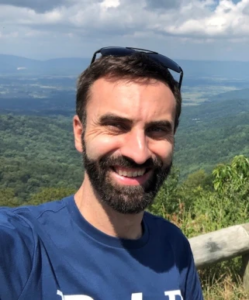
Sage Lichtenwalner works with scientists to translate their research results and data into online and offline products that can be used by K-16 students, teachers and the general public. Sage is a research programmer who concentrates on product management, design, and database driven web development. He has over a decade of experience designing and developing interactive web applications and data visualization tools that communicate cutting edge research in accessible ways. Sage has a B.S. in Physics from Rutgers University and a M.B.S. in User Experience Design.
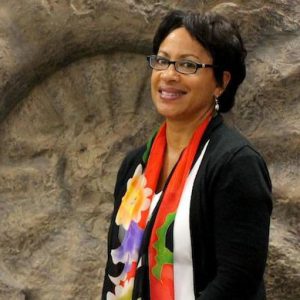
Lisa White is Director of Education and Outreach at the University of California Museum of Paleontology. Past positions held include San Francisco State University Professor of Geology, Chair of Geosciences, and Associate Dean of the College of Science and Engineering. Lisa has extensive experience with science enrichment programs for urban youth and she is active in efforts to increase diversity in the geosciences through field learning expeditions on land and at sea. A micropaleontologist by training specializing in fossil marine diatoms, she is a Fellow of the California Academy of Sciences and the Geological Society of America. As the education director at the UC Museum of Paleontology, Lisa develops and disseminates learning materials including virtual field experiences designed to explore the fossil record, global climate change, and the nature and process of science. Contact Lisa White for questions about A-STEP, ldwhite@berkeley.edu, 510-664-4966, https://ucmp.berkeley.edu/people/lisa-white/.
